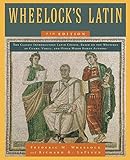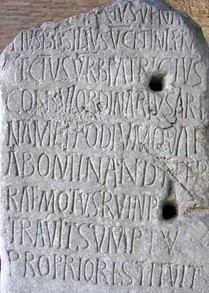
Harrius Potter et Philosophi Lapis
by Sam
Harrius Potter et Philosophi Lapis – A good book to improve your Latin skills? An unique gift idea for a Harry Potter fan? Read my review to find out more ...
Introduction
The Harry Potter books by J.K. Rowling are perhaps the most translated books of modern times. At the moment of writing this, they have been translated into 67 languages. Apart of being translated into spoken languages, they have also been translated into what is commonly known as 'dead' languages. Such as the translation of 'Harry Potter and The Philosopher's Stone' into Latin, entitled 'Harrius Potter et Philosophi Lapis'.
Reading books you already know in your native language in one you are learning is a great way to improve your language skills. I have done so, successfully, with the Harry Potter books in the past. Especially my Spanish has improved, greatly thanks to this young wizard ;-) Before I embark on my review of 'Harrius Potter et Philosophi Lapis' and how, and if it is useful for students and teachers of Latin, allow me a few words about myself.
I am a hobby linguist and generally a language and communication geek ;-) I speak, read and write three languages well and can make myself understood in a few more. Whilst I did have some Latin classes in school, today it is very rusty and barely good enough to decipher old inscriptions in Churches, Museums and so on. Reading one of my favorite books in Latin seemed like a good idea to brush up my Latin skills. Here is what I discovered to far:
Teaching Yourself Latin?
This textbook might be what you are looking for!
 | Wheelock's Latin 7th Edition (The Wheelock's Latin Series) For nearly sixty years, Wheelock's Latin has remained the opitmus liber of beginning Latin textbooks. When Professor Frederic M. Wheelock's Latin first appeared in 1956, the ... |
Reading Level
Pretty easy, everybody that had at least one year of Latin in school or college will enjoy reading and working through the text. Here a quick example of the first sentence of the book in Latin, so that you see what I mean:
"Dominus et Domina Dursley, qui vivebant in aedibus Gestationis Ligustrorum numero quattor signatis, non sine superbia dicebant se ratione ordinaria vivendi uti neque se paenitere illius rationis. ..."
It is also the shortest book of the series, making it a good length to read without being overwhelming. Around 200 pages to be exact ;-)
Having a good basic dictionary is always a good idea if you are working with a foreign language. Chances are if you are a student or teacher of Latin, you will have a few of these around ;-) If not, or if they fail you, there are a great number of free English – Latin dictionaries online. You can either try good, old >Google Translate< or, a bit more sophisticated, you can try >this one< from the University of Notre Dame.
A Short Remark about Grammar and Punctation
The rules of grammar and punctuation in Latin depend greatly on the time a text was written in, just as in any other language. In the end, we don't spell English anymore the way Shakespeare did ;-) So the translator had to make a decision which rules to follow and also if it looks weird at first, you get quickly used to it. Here are the main points:
- Proper names and inscriptions are capitalized, meaning most of the text is in lower-case.
- Punctuation and spaces are, thankfully, used throughout the text to make reading easier. Remember a lot of texts in Classical Latin didn't use any of these at all, just endless lines of letters without any interruption. See image on the right!
- The first word in the sentence is only capitalized if it is a proper noun, so many sentences start with a lower-case word. At first that is weird, but you'll get used to it.
About the Translator
Peter Needham, who translated 'Harry Potter and The Philosopher's Stone' into Latin is a, now retired, former teacher of Classic Languages (Latin and Greek) at the world-famous Eton College (UK) where he taught for more than 30 years. He famously said about this task: ¨It's an ideal job for an old bloke in retirement." He also translated: Harrius Potter Et Camera Secretorum (Harry Potter and the Chamber of Secrets), Paddington Bear (Ursus Nomine Paddington) and other children's books such as Peter Rabbit and Alice in Wonderland into Latin.
More Great Books in Latin
 |  |  |
| Winnie Ille Pu (Latin Edition) | Introduction to Latin (English and La... | Wheelock's Latin, 7th Edition (The Wh... Only $13.29 |
 |  |  |
| Thirty-Eight Latin Stories Designed t... | Harrius Potter et Philosophi Lapis (H... | Introduction to Latin: A Workbook (En... |
Why Reading Books in Latin?
- Simple, studying a dead language like Latin can get a bit dusty and tiring over time, reading something else than the usual stuff (Cesar's “Commentarii de Bello Gallico / On the Gallic War comes painfully to mind) can put the fun back into it.
- J.K. Rowling herself read Latin at university and it shows through the whole series, especially in the name of the characters and the spells. Reading them in Latin is kind of a logical step for a fan ;-)
- Apart of reading it, you can also try to translating it back into English, or, if you have the English version, try to translate that one into Latin on your own and compare your version with the official translation.
- Teachers can use the book to let students write essays about how and why certain words were used to translate modern concepts like car (autocinetum) or as an alternative to the usual, boring material. There are really endless possibilities to use this book in a classroom or in home studies.
Further Reading
On Translating Modern Books into Ancient Languages
This is a great article by the translator of the first Harry Potter book into Ancient Greek who explains nicely how he did it, what the challenges of such a translation are and why he did things the way he did. I would have loved to read a similar essay by Peter Needham, but alas, it seems he hasn't published one ;-( If you know of one, please leave a reference in a comment ;-)
Summary
- A great book for brushing up your Latin skills and putting the fun back into studying the Lingua Latina.
- A fun, and intelligent, gift for the philosopher in your life.
- Endless possibilities for classroom activities and home study.
If you are still not sure if 'Harrius Potter et Philosophi Lapis' is right for you, just read the first chapter 'Puer qui vixit' for free. To do this click on the small image on the right, which will take you to Amazon, and then click on 'Lock Inside!' on the top of the page and you can start reading it instantly.
Do You like to write? Do You want to earn money with Your writing?
Simply click the banner below and sign up for FREE!
You might also like
British English Phrases, Idioms, and Expressions (Letters A-C)By Mira at Wizzley. Some of my favorite words and phrases that are particular...
English Words with Odd SpellingsEnglish is full of words whose spelling make no sense compared to the way the...






 How to Choose the Topic for your First Bookon 12/17/2012
How to Choose the Topic for your First Bookon 12/17/2012
 Why I published my first book on Amazon - and you should too ;-)on 11/30/2012
Why I published my first book on Amazon - and you should too ;-)on 11/30/2012
 What to do with Kids in Prague - Go To the ZOOon 10/30/2012
What to do with Kids in Prague - Go To the ZOOon 10/30/2012
 Choco Story Museum - Things to do with Kids in Pragueon 10/30/2012
Choco Story Museum - Things to do with Kids in Pragueon 10/30/2012


Comments
So true TabithaY, even people like me that have little Latin left, hidden in a dusty corner of their brains can still enjoy it as the translation is good and accurate but not overly complicated. Thanks for your comment and glad to meet another Harrius Potter fan here ;-)
My sister and brother-in-law gave this to me several years ago: I'm a Harry Potter fan, and my brother-in-law is a Roman history buff. I haven't studied Latin in almost 30 years, but I was amazed by how much I could still understand! It's a fun way to shake off a little of the linguistic rust.
My Latin is also very rusty ;-) But it is an relatively easy read. Have a look at the online dictionary I mentioned, the one from the ND university or if your are really serious about working through Harrius Potter et Philosophi Lapis look if you can pick up a Wheelock somewhere cheap or second hand for the grammar bits.
Oh I agree, reading Harry Potter in Latin can put back the fun into learning Latin. I must give it a try. My Latin is very limited but I think with a good dictionary as companion I can do it.